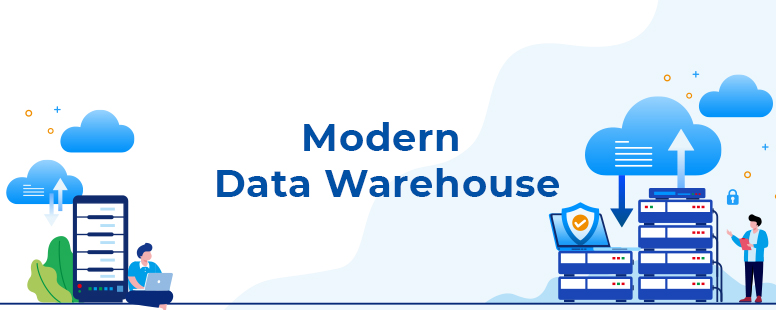The problem with traditional data warehouse & the need of modern data warehouse
A Modern Data Warehouse is now a must for almost every business.
A modern data warehouse helps you to seamlessly pull all your data together and gain valuable insights for your users via the analytical dashboard, report, or sophisticated analytical method.
In other words, a Modern Data Warehouse can manage significantly bigger amounts of data and perform complicated operations on a variety of data types, providing you with in-depth insights.
A traditional on-premise data warehouse is often built and maintained by an internal IT team.
Your team will also need to set up storage, install the tools needed to conduct database updates, and choose which data sources will flow into your warehouse and how frequently you will update your data.
While having your warehouse on-site may appear tempting, it frequently causes issues that would not exist if your warehouse was in the cloud.
While some firms still use on-premise warehouses, the majority of companies have moved their warehouses to the cloud.
The modernization of data warehouses is a term used to describe this movement. This enables businesses to quickly scale their data warehouses to meet their specific requirements.
Modernizing your warehouse will benefit your business
Companies used to keep data in databases and application systems, not giving much thought to the information they had on hand. Later as cloud technology started reaching new heights in the pandemic, companies began to examine the data over time in order to understand more about their consumers, business, and so on.
- Enhanced Efficiency
Gathering data from numerous sources takes a long time for a business user or a data scientist. It’s significantly more convenient to have all of this information in one location, which is why a data warehouse is so useful.
Furthermore, if you require data to run a quick report, you do not require assistance from tech support to complete this activity. A data warehouse makes this data easily accessible — in the correct format — improving the process’ overall efficiency.
- Consistent Quality Data
Your company creates data in a variety of formats, including structured and unstructured data, social media data, and sales campaign data. A data warehouse translates this information into the formats that your analytics tools require.
Furthermore, a data warehouse ensures that data provided by multiple business divisions are of the same quality and standard, allowing for a more efficient analytics feed.

- Increased power & speed
Business Intelligence and analytics require standardized high-quality data — on time and available for fast data collection. A data warehouse allows for this power and speed, providing for competitive advantages in critical areas for successful sales and quarterly reporting.
- Scalability
“scalable” is the new buzzword in the cloud era, and a data warehouse is a fundamental factor in achieving that scale. A modern data warehouse is scalable allowing increased business scalability.
Today’s sophisticated data warehouses are built to scale, allowing them to handle increasing numbers of queries as the company grows. Furthermore, a data warehouse’s effectiveness in data flow considerably helps a company’s growth – and growth is at the heart of business scalability.
- Data Security
A number of significant advancements in data warehouse security have improved the overall security of enterprise data. Techniques like a “slave read-only” setup, helps in creating encrypted columns which secure personal data.
On their data warehouses, some companies create unique user groups that can include or exclude specific data pools and even grant permission row by row.
- Competitive Advantage
The bottom-line benefit of a data warehouse is that it allows a company to strategize and execute more effectively against competitors in its industry.
Greater insight in data mining can drive decisions that result in higher sales, better-focused products, and faster response times, thanks to the quality, speed, and historical context supplied by a data warehouse.
In short, a data warehouse helps businesses make better decisions, which offers them a competitive advantage.
To sum it up
To make excellent decisions, you need to be able to quickly look back at early trends and have accurate data that is appropriately formatted.
A modern data warehouse allows decision-makers to learn from past trends and issues by providing this historical insight. The benefit of a data warehouse is constant improvement.
Modern data warehouses in comparison to the traditional system can also scale with a business; as a company grows, it requires more and better data, and data warehouses can (with the right technology) become increasingly robust in their ability to handle queries.

